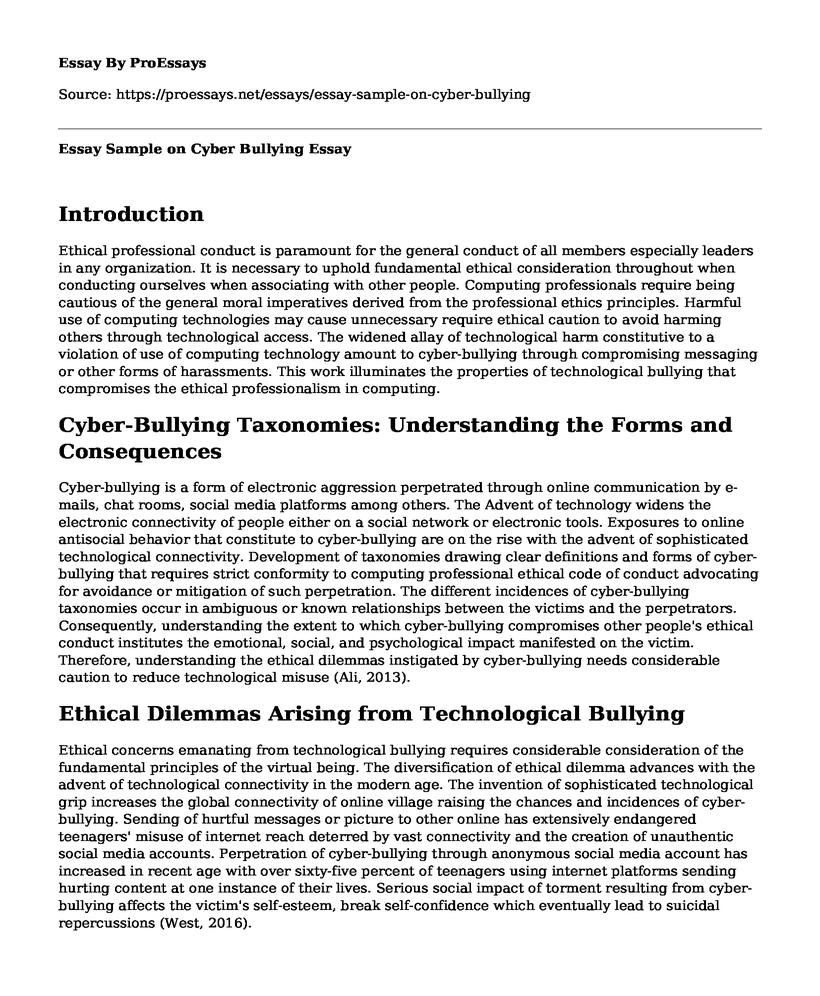Introduction
Ethical professional conduct is paramount for the general conduct of all members especially leaders in any organization. It is necessary to uphold fundamental ethical consideration throughout when conducting ourselves when associating with other people. Computing professionals require being cautious of the general moral imperatives derived from the professional ethics principles. Harmful use of computing technologies may cause unnecessary require ethical caution to avoid harming others through technological access. The widened allay of technological harm constitutive to a violation of use of computing technology amount to cyber-bullying through compromising messaging or other forms of harassments. This work illuminates the properties of technological bullying that compromises the ethical professionalism in computing.
Cyber-Bullying Taxonomies: Understanding the Forms and Consequences
Cyber-bullying is a form of electronic aggression perpetrated through online communication by e-mails, chat rooms, social media platforms among others. The Advent of technology widens the electronic connectivity of people either on a social network or electronic tools. Exposures to online antisocial behavior that constitute to cyber-bullying are on the rise with the advent of sophisticated technological connectivity. Development of taxonomies drawing clear definitions and forms of cyber-bullying that requires strict conformity to computing professional ethical code of conduct advocating for avoidance or mitigation of such perpetration. The different incidences of cyber-bullying taxonomies occur in ambiguous or known relationships between the victims and the perpetrators. Consequently, understanding the extent to which cyber-bullying compromises other people's ethical conduct institutes the emotional, social, and psychological impact manifested on the victim. Therefore, understanding the ethical dilemmas instigated by cyber-bullying needs considerable caution to reduce technological misuse (Ali, 2013).
Ethical Dilemmas Arising from Technological Bullying
Ethical concerns emanating from technological bullying requires considerable consideration of the fundamental principles of the virtual being. The diversification of ethical dilemma advances with the advent of technological connectivity in the modern age. The invention of sophisticated technological grip increases the global connectivity of online village raising the chances and incidences of cyber-bullying. Sending of hurtful messages or picture to other online has extensively endangered teenagers' misuse of internet reach deterred by vast connectivity and the creation of unauthentic social media accounts. Perpetration of cyber-bullying through anonymous social media account has increased in recent age with over sixty-five percent of teenagers using internet platforms sending hurting content at one instance of their lives. Serious social impact of torment resulting from cyber-bullying affects the victim's self-esteem, break self-confidence which eventually lead to suicidal repercussions (West, 2016).
Prominent of virtual ethics forms the primary theoretical approach to enlighten young users on the wise utilization of internet communication upholding ethical sensitivity of the computing profession and other users. Nurturing the character virtues of internet users especially young people to influence their communication morality requires recognition of positive perspective on virtue ethics and technological determinism. The adoption of the tenets of moral theory on virtue ethics in computing professionalism requires sensitivity in distinguishing right and wrong on properties of self-discipline, humility, compassion, positive regards, and trust of the members of the unseen global online village. Upholding self-discipline directs individuals to actively engage with others on online platforms without violating their decency through provocative messaging. The prominence of moral theory advocating against harming others on technological base as cyber-bullying emphasize on responsible conduct of digital citizens being mindful of others authenticity (Harrison, 2015).
Conclusion
In conclusion, upholding vital universal morality on compromised harming other people through online texting and other technological platforms have in recent age advanced with the sophistication of internet connectivity. Cyber-bullying perpetrates morality that leads to compromised self-esteem leading to social seclusion or suicidal repercussions of harassed victims.
References
Ali, A. (2013). Cyber-bullying taxonomies: Definition, forms, consequences and mitigation strategies. In 2013 5th International conference on computer science and information technology (CSIT) (p. 126-133).
Harrison, T. (2015). Virtuous reality: moral theory and research into cyber-bullying. Springer Nature Journal, Vol 17, (4), pp 275-283
West, D.M. (2016). The ethical dilemmas of virtual reality, Brookings. Available at https://www.brookings.edu/blog/techtank/2016/04/18/the-ethical-dilemmas-of-virtual-reality/
Cite this page
Essay Sample on Cyber Bullying. (2022, Apr 19). Retrieved from https://proessays.net/essays/essay-sample-on-cyber-bullying
If you are the original author of this essay and no longer wish to have it published on the ProEssays website, please click below to request its removal:
- Tackling School Violence Paper Example
- Essay Example on Terrorism: Causes, Consequences, and Solutions
- Terrorism in 21st Century: Exploring the Use of Social Noise - Essay Sample
- Annotated Bibliography on Mexican Drug Cartels: Thriving Despite Security Measures
- Women In Mythology: Male Dominance in Ancient Stories - Essay Sample
- Essay Example on Bullying of Disabled Children in Schools: Negative Impacts on Learning
- Family Violence: Unacceptable Conduct Between Intimate Relationships - Essay Sample







